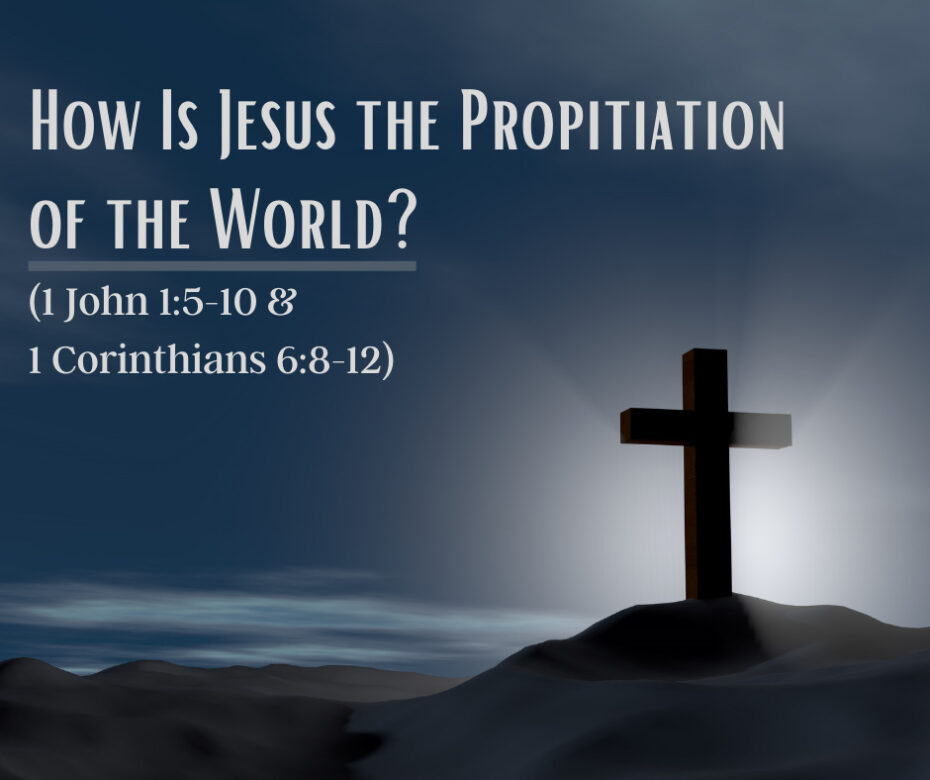Question
How do you explain 1 John 1:5-10 and 1 Cor 6:8-12? I believe that John is speaking of salvation here. It does not seem to fit with the two-benefit view (if that is what this view is called). How is He the propitiation for the sins of the whole world but the blood of Christ does not cleanse people until they “walk in the light”/confess? And 1 Cor 6:11 says that some of the Corinthians were unrighteous in the ways Paul mentions in the previous verses. However, they were washed, sanctified, and justified. Washed implies the removal of something, and in this passage that appears to be the unrighteousness from the list of sins Paul gives. How can these now saved people be said to be formerly unrighteous because of these sins if these sins were paid for already when Christ died?
Answer
Thank you for the questions. To recap, my “big idea” about the cross and its benefits is not that there are two benefits, but many. We need to rethink the assumption that those benefits come as a package that is either limited (as per Calvinism) or unlimited (as per Arminianism and 4-Point Calvinism). Instead, could it be that the cross’s benefits do not come as a package at all? Could there be different benefits, for different people, given under different conditions (see here)? My point in writing the blog on Chafer that you mention (see here) was that he seemed to be rejecting the “package” assumption, too.
Coming to your questions, I think they can be answered by distinguishing “positional truth” and “experiential truth.”
The Difference Between Two Kinds of Truths
Positional truth concerns how God sees you in Christ. These are truths that are imputed to you irrespective of how you live. By contrast, experiential truths describe your lived experience.
For example, forensic justification is the ultimate positional truth. God reckons you as righteous positionally, even though, in fact, you are unrighteous in your experience.
Understanding the difference between positional and experiential truths helps to answer your questions.
The Corinthians Were Washed
In 1 Cor 6:11, Paul described some things that are true of the Corinthians in their position that were not true in their experience:
And such were some of you. But you were washed, but you were sanctified, but you were justified in the name of the Lord Jesus and by the Spirit of our God (1 Cor 6:11).
In their position, they were sanctified and justified and washed. Compare what Jesus said to the disciples in John 13:10, where the Lord pointed to a difference between a once for all cleansing and their need for an ongoing washing of the feet. He seems to be illustrating two different kinds of forgiveness—once-for-all positional forgiveness (e.g., a whole-body wash) and ongoing fellowship forgiveness (e.g., a washing of the feet). We need both. So did the Corinthians. They were washed in their position but still needed correction and growth in their experience.
Ongoing Forgiveness
I think 1 John 1:5-10 is also best understood in light of the distinction between position and condition. Most Free Grace interpreters take this as the “foot washing” type of forgiveness described by Jesus. And to have that, simply believing is not enough. You must also walk in the light and confess those sins. When you do, Jesus washes your feet.
Jesus Is the Mercy Seat
How is Jesus the propitiation for the sins of the whole world (1 John 2:2)? Frankly, I’m still working on the answer. As I write a book on the benefits of the cross, I try to ask three questions of each of these texts.
Who is the beneficiary? In 1 John 2:2, it is both believers and “the whole world.” That means there is some sense in which the death of Christ benefits the whole world.
What is the benefit? Many commentators say that Jesus is a propitiation in the sense that He is “a sacrifice that turns away God’s anger” (Eaton, 1, 2, 3 John, p. 46). He has “appeased God’s just wrath against sin by his sacrificial death for the whole world” (Tony Evans Bible Commentary, p. 1372). However, in Romans, Paul describes God as presently demonstrating His wrath against sin against both believers and unbelievers (Rom 1:18). So in what sense does Jesus appease that wrath?
I wonder if 1 John 2:2 should be understood in light of Rom 3:25. In that verse, Paul says that Jesus was “set forth as a propitiation” which Hodges translates as “set forth as a Mercy Seat.”
The Mercy Seat was the golden covering over the Ark of the Covenant. On the Day of Atonement, the high priest sprinkled blood on the Mercy Seat. Here is how Hodges describes what that means: “His role is to be a ‘meeting place’ between God and man whenever man exercises faith in God’s Son” (Hodges, Romans, p. 100). Could that be what 1 John 2:2 means, too? That is, Jesus is the Mercy Seat, not just for believers but for the world. He is the only “meeting place” between God and man—the only place to propitiate God’s wrath.
What is the condition for receiving the benefit? It does not seem to be automatic. I think the conditions look back to 1 John 1:7, 9. To enjoy Jesus as our Advocate (1 John 2:1), or as our “Propitiation,” you must have already believed in Him, and then you must walk in the light and confess your sins to God. When you do, Jesus argues your case, God’s wrath is satisfied, and His blood cleanses you.


